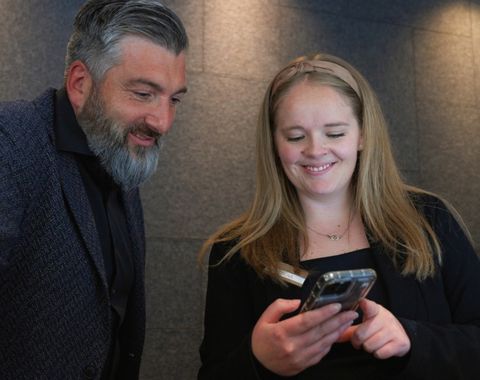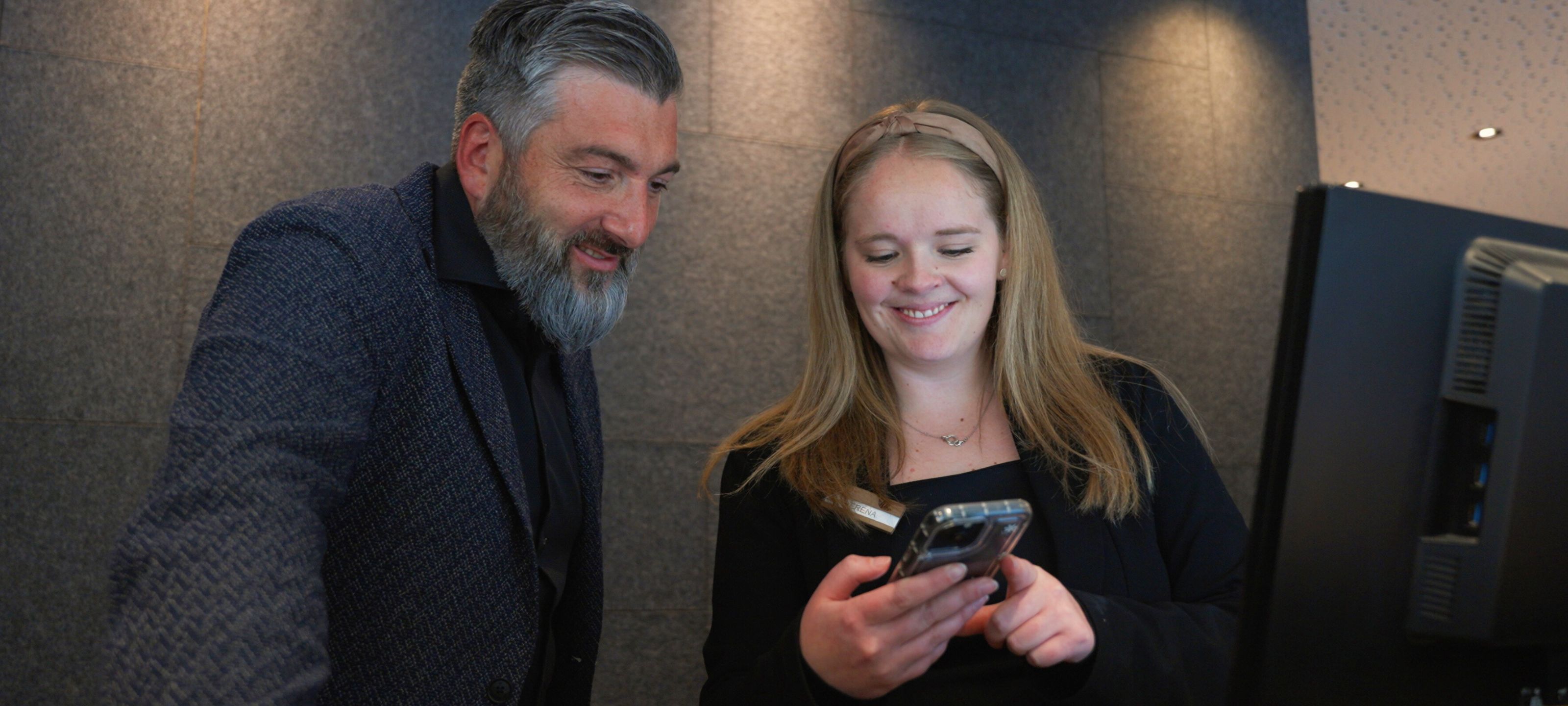
In Conversation with Dr. Aljoscha Burchardt, DFKI Berlin

Dr. Aljoscha Burchardt from the German Research Center for Artificial Intelligence (DFKI) offers fascinating insights into the future of marketing automation. Discover how AI technologies are revolutionizing the hospitality industry and enabling more efficient, personalized guest relationships.
AI in Tourism
<div class="article_quote is-img">
<img
src="https://cdn.prod.website-files.com/673f1b4d7fc04861927e7983/67b4418edfc466cd4ba7f96c_800x800px%20-%20Im%20Ge_spra%CC%88ch%20mit%20Dr.%20Aljoscha%20Burchardt%2C%20DFKI%20Berlin.jpg" loading="lazy" alt=""
class="article_quote_img">
<div class="article_quote_contain is-img">
<div class="article_quote_quote">
"Assistance systems should be used to improve customer service, especially in tourism." </div>
<div class="article_quote_name u-text-style-main">
Dr. Aljoscha Burchardt
</div>
</div>
</div>
Dr. Aljoscha Burchardt has been an expert in language technology and artificial intelligence at the German Research Center for Artificial Intelligence (DFKI GmbH) in Berlin since 2010, where he has led various large-scale projects in the field of machine translation. Since August 2019, he is also deputy spokesperson of the DFKI. Previously, he completed his Ph.D. in computational linguistics at Saarland University and worked as a researcher at TU Darmstadt. He is also a member of the German Bundestag's Enquete Commission on Artificial Intelligence, which is investigating the impact of AI on social life, the German economy, and the world of work.
<h3 class="interview-question">What is the DFKI (German Research Center for Artificial Intelligence) and what are its main tasks?</h3>
The DFKI was founded in 1988. At that time, the goal was to improve knowledge transfer between university research and industrial research. There is still a lot to be done in terms of knowledge transfer, even though the DFKI has been around for a long time and we have grown successfully. We have more than 600 employees and 20 research groups.
The topics we research include robotics, language, image processing, Industry 4.0, wearables or business informatics. We work in consortia with industry and also apply for publicly funded projects with our partners. In addition, we are connected to universities, as all our group leaders are professors at the respective universities at their locations.
DFKI is a non-profit limited liability company, which means that we are not allowed to make a profit. We do not receive one hundred percent public funding, but have to make our own contribution. In return, we are allowed to close this gap by accepting free contracts and thus make a profit, but only to the extent of the gap we want to close. This way we can really do a lot for relatively little money. If there is an opportunity to make a higher profit, we have to create a spin-off. This has happened 90 times in the last 30 years.
That shows how broad our scope is: our work ends with what we call a research prototype or proof of concept. Turning this into a product, with all the legal measures and certifications, is no longer one of our tasks. This is done either by our customers, partners or spin-offs.
<div class="article_quote"><div class="article_quote_contain"><div class="article_quote_quote">"Most people aren’t aware that the first step toward digitalization is to streamline their existing processes."</div><div class="article_quote_name u-text-style-main"> </div></div></div>
<h3 class="interview-question">How do you set up an AI project?</h3>
When people come to us looking to acquire AI projects, the first thing we do is look at what the project is about. Typically, these are research and development projects where the question is not yet clear. We have to find out what data is available, whether it is structured or unstructured, and whether we can use it at all. Most people are not aware that the first step in digitization is to clean up their existing processes.
The fundamental confusion that still exists is the difference between strong and weak AI. People immediately think of strong AI, of robots that solve all problems and have an answer to all questions. People come to us with this expectation, and then we have to clarify that we are talking about weak AI. In other words, AI that prepares appropriate data for a human-defined goal and processes it using various technologies. Therefore, in order to implement a project, you need a goal, data and quality measures (KPIs) to check if the result works.
<h3 class="interview-question">What are your lines of business? How many people are on your team?</h3>
I am a computational linguist. My field is language technology, and our group has about 30 people. The first thing people think of is dictation systems and speech output, but we do the least of that. For us, it's about what happens in between.
For example, we try to filter out mobility barriers from Twitter messages. If someone posts a tweet that says, "Elevator at Südkreuz is broken," we have to figure out what city Südkreuz is in and whether that message matches other information we have from the same area. That way you can create an early warning system that lets people know that they can't get through somewhere, that there's a demonstration going on, or that they need to get off at the next stop. In short, it's about extracting concrete information from big data streams.
I also spent a lot of time looking at the quality of machine translation. I compared what is measured in research and what translators need in terms of quality standards. There was a big discrepancy, because research in this area had largely bypassed the market.
Opportunities and Challenges
<div class="article_quote"><div class="article_quote_contain"><div class="article_quote_quote">"Chat systems currently only work effectively when they control the dialogue and prompt the user."</div><div class="article_quote_name u-text-style-main"> </div></div></div>
<h3 class="interview-question">What are you working on right now? What major projects are in the pipeline?</h3>
One topic that is very much in demand right now is mobility - both public mobility and individual applications. Medicine is also a big driver. We're also working on data curation in journalism and media, or with curators who need to design exhibitions and help them with research.
Chatbots were a big topic for a while, but the interest has flattened out a bit. The initial expectations were probably too high. Chatbots still work the same way as Karl Klammer (note Microsoft Office Assistant as a cartoon paperclip) and the popular Ikea bot from 2000. Not much has changed technologically. This is an area where AI can't simply learn from data how a service dialog works. The tasks that call center agents have to perform cannot be mapped one-to-one. It is necessary to do a lot of knowledge building with the machine. Chat systems currently only work when they control the dialog and ask the human. If the person actively initiates the conversation and starts talking, the systems are quickly overwhelmed because they don't know what to filter out of the voice input.
<h3 class="interview-question">Cambridge Analytica has already shown what is possible with data analysis. How relevant is your research for policymakers?</h3>
The Enquete Commission is a large commission that is looking at the whole range of AI. It consists of 19 members of the Bundestag and 19 external experts, and is divided into six working groups that deal with different topics, such as medicine, mobility, or media. I am part of the media working group, which is looking at social bots, upload filters, fake news and the like. The politicians who participate are well informed, have a high level of knowledge and largely agree on what works and what is problematic. However, I often hear from these politicians that they don't have as much of a voice on AI in their own caucuses. Their colleagues don't want to be burdened with these issues, and it's a similar story in the general population.
In addition, there is a debate about whether companies like Cambridge Analytica really have that much influence, or whether they took advantage of the situation to play up. That's where we come back to research and education: we need data scientists and socio-computer scientists who are capable of researching this kind of thing and who are familiar with both the technology and the social disciplines. We are not yet in a strong enough position to do that. I don't want to minimize the phenomenon, but we still need to clarify its meaning.
AI Assistance and Personalized Guest Service
<h3 class="interview-question">At ITB 2020 (canceled due to the COVID 19 pandemic) you would have discussed "Voice Commerce: Selling travel and hotel rooms via Amazon Alexa and Google Assistant." What would have been your key messages on this topic?</h3>
My role in the discussion would have been to provide an overview of where we are now and how the technologies will evolve. Today's assistance systems have a very manageable range of functions, such as turning on lights, booking a flight, or playing music. They just scratch the sureface.
<div class="article_quote"><div class="article_quote_contain"><div class="article_quote_quote">"But especially in tourism, such systems should be used to serve the customer better. For example, to offer not only a room in the right category, but also tourism programs or dining options to strengthen customer loyalty. "</div><div class="article_quote_name u-text-style-main"> </div></div></div>
In this context, it is interesting for me to ask how an assistance system can ensure the corporate identity of the company and address customers in an appropriate way. One customer may be on his way to the airport and doesn't want to waste time; another customer may be sitting at home and bored and has more time. With emotion recognition, you can learn a lot about your customers and be very personalized. I would have liked to ask the other experts on the panel where we are now and where we need to go, especially from a research perspective.
<div class="article_quote"><div class="article_quote_contain"><div class="article_quote_quote">"Hotel staff could be supported by machines to enhance the level of personalization through relevant recommendations and tailored tips."</div><div class="article_quote_name u-text-style-main"> </div></div></div>
<h3 class="interview-question">In your field, what will be the most fascinating experience in a hotel in 2030?</h3>
You'll have a different level of service without a lot of extra effort. Every guest will be served in a way that only VIP guests are served today. For example, the right music will be played, menus will be customized, or procedures will be adjusted.
When I'm a guest in a hotel, I often find that the staff can't give you appropriate answers when you ask questions that go beyond those of regular guests. For example, if you ask for a good chip shop in an upscale hotel. Here, the staff could be automatically assisted to increase the level of personalization by providing appropriate recommendations and individualized tips.
<h3 class="interview-question">Is there a personality in tourism (or any other field) that you have always wanted to meet? Why and what would be your main question to this person?</h3>
Up to now, I have always found it disillusioning to meet celebrities. They're just people, and when you stand in front of them and ask them questions, they sometimes respond rather listlessly - much like chatbots.
The other day, I even picked out a celebrity I wanted to talk to, and it was a comedian I thought was incredibly good when I was a kid. Funnily enough, I actually saw him some time later at a big summer festival. But I didn't talk to him because you could tell he didn't want to.








.jpg)

.jpg)



.webp)
